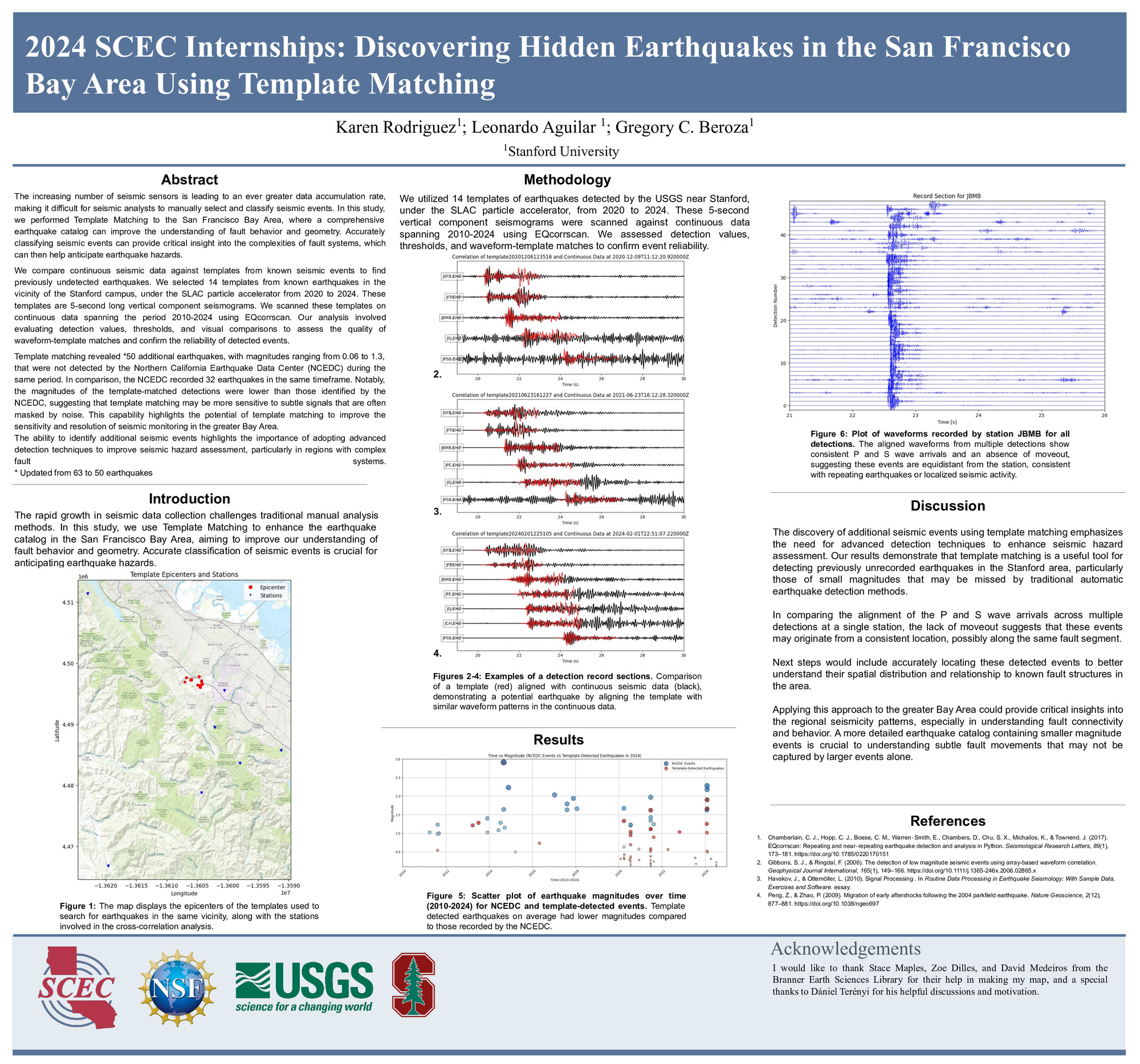Group A, Poster #057, Seismology
Discovering Hidden Earthquakes in the San Francisco Bay Area Using Template Matching
Poster Image:

Poster Presentation
2024 SCEC Annual Meeting, Poster #057, SCEC Contribution #14014 VIEW PDF
The increasing number of seismic sensors is leading to an ever greater data accumulation rate, making it difficult for seismic analysts to manually select and classify seismic events. In this study, we performed Template Matching to the San Francisco Bay Area, where a comprehensive earthquake catalog can improve the understanding of fault behavior and geometry. Accurately classifying seismic events can provide critical insight into the complexities of fault systems, which can then help anticipate earthquake hazards.
We compare continuous seismic data against templates from known seismic events to find previously undetected earthquakes. We selected 14 templates from known earthquakes in the vicinity of the Stanford campus, under the SLAC particle accelerator from 2020 to 2024. These templates are 5-second long vertical component seismograms. We scanned these templates on continuous data spanning the period 2010-2024 using EQcorrscan. Our analysis involved evaluating detection values, thresholds, and visual comparisons to assess the quality of waveform-template matches and confirm the reliability of detected events.
Template matching revealed 63 additional earthquakes, with magnitudes ranging from 0.06 to 0.8, that were not detected by the Northern California Earthquake Data Center (NCEDC) during the same period. In comparison, the NCEDC recorded 32 earthquakes in the same timeframe. Notably, the magnitudes of the template-matched detections were lower than those identified by the NCEDC, suggesting that template matching may be more sensitive to subtle signals that are often masked by noise. This capability highlights the potential of template matching to improve the sensitivity and resolution of seismic monitoring in the greater Bay Area.
The ability to identify additional seismic events highlights the importance of adopting advanced detection techniques to improve seismic hazard assessment, particularly in regions with complex fault systems.
We compare continuous seismic data against templates from known seismic events to find previously undetected earthquakes. We selected 14 templates from known earthquakes in the vicinity of the Stanford campus, under the SLAC particle accelerator from 2020 to 2024. These templates are 5-second long vertical component seismograms. We scanned these templates on continuous data spanning the period 2010-2024 using EQcorrscan. Our analysis involved evaluating detection values, thresholds, and visual comparisons to assess the quality of waveform-template matches and confirm the reliability of detected events.
Template matching revealed 63 additional earthquakes, with magnitudes ranging from 0.06 to 0.8, that were not detected by the Northern California Earthquake Data Center (NCEDC) during the same period. In comparison, the NCEDC recorded 32 earthquakes in the same timeframe. Notably, the magnitudes of the template-matched detections were lower than those identified by the NCEDC, suggesting that template matching may be more sensitive to subtle signals that are often masked by noise. This capability highlights the potential of template matching to improve the sensitivity and resolution of seismic monitoring in the greater Bay Area.
The ability to identify additional seismic events highlights the importance of adopting advanced detection techniques to improve seismic hazard assessment, particularly in regions with complex fault systems.















































